News
Is the Kubernetes Skills Gap Shrinking?
The enterprise skills gap for just about anything to do with IT is a widely known, years-long problem, especially in the cloud computing space for initiatives like Kubernetes implementations. It has shown few if any signs of slowing down.
Yet there may be a ray of hope: New year-over-year findings in a Kubernetes/cloud native study conducted by Canonical show a smaller percentage of respondents listing "lack of in-house skills/limited manpower" as the biggest challenge when migrating to/using Kubernetes and containers, though it's still the No. 1 challenge.
Specifically, in Canonical's 2022 Kubernetes and Cloud Native Operations Survey, 48 percent of respondents say lack of in-house skills and limited manpower are the biggest obstacles to migrating to or using Kubernetes and containers, while the 2021 report had 54.5 percent of respondents citing that challenge as their top issue.
Well, that's something, at least.
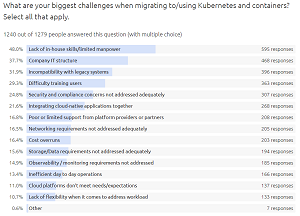 [Click on image for larger view.] 2022 Challenges (source: Canonical).
[Click on image for larger view.] 2022 Challenges (source: Canonical).
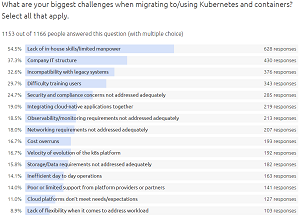 [Click on image for larger view.] 2021 Challenges (source: Canonical).
[Click on image for larger view.] 2021 Challenges (source: Canonical).
It might not be indicative of a long-term general trend, however.
"I expect 'lack of in house skills and limited manpower' to remain the top challenge in the years to come, as the technology landscape is constantly changing," Ihor Dvoretskyi, senior developer advocate, was quoted as saying in the report. "I see this as a very good challenge to solve. People need to constantly upskill and new job roles are being created as the enterprise needs are evolving with the technology." Upskilling is one of many initiatives that organizations use to address the pervasive talent dearth, as we covered in the article "How to Address Crippling Cloud Skills Shortage?"
Mark Shuttleworth, founder and CEO of Canonical (known for its popular Ubuntu Linux distro), also weighed in: "I suspect that difficulty training users, which is another way to look at the skills gap, is only going to increase. This is one of the hard issues that have yet to be addressed in Kubernetes. The people who wanted to learn, the early adopters, have already learned. Now it's everybody else's turn to learn, but these people don't really have an incentive and are going to be harder to teach. There may be a line that some people never cross, there may be some parts of the organization that just don't want to go there. Unlike previous generational shifts, like UNIX to Linux, there isn't really an economic thing to push people. At the end of the day, if you feel perfectly productive, running your app without Kubernetes, you will just keep doing it that way."
Yet another take on the issue was provided by Ken Sipe, senior enterprise architect and co-chair of the Operator SDK, who said: "When people mention the lack of skill as a blocker, the truth is that they are often already in an environment where they are ready to do the next thing but don't have the infrastructural or organizational support to do so. It is also a matter of buy versus build: when buying a solution and associated service, an organization benefits from leveraging external resources and skillsets without having to build the capability in-house. When building it in house, the organization can benefit from implementing its engineering discipline, which could be a useful differentiator."
So the answer to the question headlining this article -- aligning with Betteridge's law of headlines -- is probably "no" in absence of further corroborating data, for which we'll keep an eye out. It may be that respondents to the new survey have merely found other challenges have grown in importance relative to the skills gap, as indicated in the article "Supply Chain, Inflation Challenge Skills Dearth as Top Cloud Problem." Time will tell.
In the meantime, other highlights of the report as presented by Canonical include:
-
Hybrid vs multi-cloud: the reality behind the adoption: More than 83 percent of respondents said they're using either hybrid or multi-cloud. In the last year alone, the percentage of respondents who did not use hybrid or multi-cloud dropped from 22.4 percent to 16.4 percent.
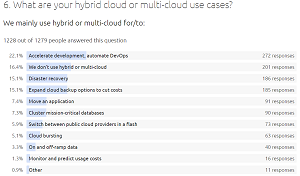 [Click on image for larger view.] Hybrid/Multi-Cloud Use Cases (source: Canonical).
[Click on image for larger view.] Hybrid/Multi-Cloud Use Cases (source: Canonical).
-
Kubernetes on bare metal: The question of where to run applications is an interesting one. 14 percent of respondents said that they run everything on Kubernetes, over 20 percent said on bare metal and VMs, and over 29 percent said a combination of bare metal, VMs, and Kubernetes.
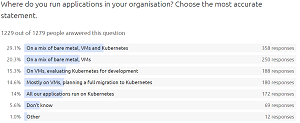 [Click on image for larger view.] Where Applications Run (source: Canonical).
[Click on image for larger view.] Where Applications Run (source: Canonical).
-
Security is still everyone's concern: This comes as no surprise: 38 percent of respondents suggest that security is the most important consideration whether when operating Kubernetes, building container images or defining an edge strategy. Keeping clusters up-to-date is a definitive best practice to solve security issues.
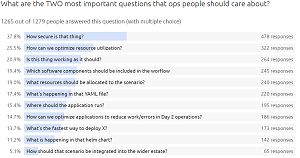 [Click on image for larger view.] How Secure Is That Thing? (source: Canonical).
[Click on image for larger view.] How Secure Is That Thing? (source: Canonical).
-
An app store for operators: When asked if they would trust an operator built by an expert, more than 50 percent of respondents said yes. This makes sense considering that the skills gap is a major issue for organizations.
 [Click on image for larger view.] App Store? (source: Canonical).
[Click on image for larger view.] App Store? (source: Canonical).
- What is in store for the future? Despite the obstacles, Kubernetes adoption is consistently growing. It is only fair to try and think about what the future holds. For Ihor Dvoretskyi, the high-level goals -- improving maintenance, monitoring and automation, and infrastructure modernization -- are likely to stay the same in the years to come. However, use-case related evolutions are to expect, in particular in the AI/ML and data platforms space. And as the platform evolves to support more diverse tools, the goals of its users will evolve with it.
"According to the survey, Kubernetes and cloud native technologies unlock innovation for organizations and allow them to achieve their goals," Canonical said. "But the benefits of cloud native technologies vary, depending on their usage and the maturity of the organizations using them, with elasticity and agility, resource optimization and reduced service costs identified as the top benefits, and security the most important consideration."
Canonical's methodology for the report was: "The Kubernetes and cloud native operations survey used to collect the data for this report ran in late November 2021 after Kubecon North America. Nearly 1,300 people responded to the survey. We collected expert 3rd party commentary on the results from the public clouds, ISVs, and from an expert in the financial industry who also co-chairs the Operator Framework at the CNCF."
About the Author
David Ramel is an editor and writer at Converge 360.